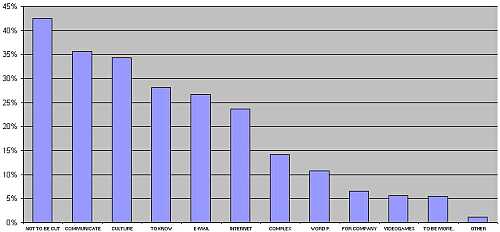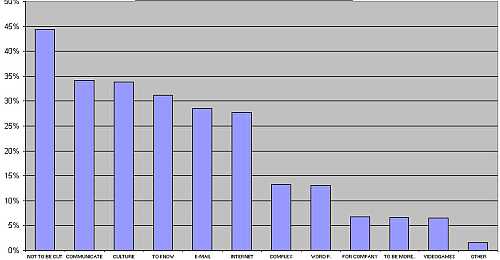PRESENTATION TWO
SURVEY RESULTS
ADULTS, FREE TIME AND NEW TECHNOLOGIES
The University for Adult and Senior Citizens of Vicenza has conducted a sociological research among the senior students in the province of Vicenza, and a sample of students of the University of Belluno. The collected questionnaires were 1.704 (1.559 in Vicenza, and 145 in Belluno. 30% of the answers are of men, and 70% of women. The average age is as follows: 2.76% 39-44 years old, 12.62% 45-54, 38.56% 55-64, 29.28% 65-74,8.74% over 75.
Concerning the education level only 4.23% have got a university degree; the major part has secondary (57.21) and primary school.
The aim of the research was to find out the students' opinion about the problems and concerns of men and women between 40 and 50 years old, within the framework of the rapid cultural changes of society in the Veneto region. There were two main themes on which the questionnaire was based: modern music and computers.
The choice of submitting the questionnaire to an "external" sample of people, that is to say the Belluno students, aimed at comparing the situation in the province of Vicenza, which already started its peak of industrial development a few decades ago with the situation of a province, Belluno, which only recently entered its industrial phase of development.
Some data expressed by the interviewed people give the image of the adult/senior as a dynamic, and enough selt-confident individual, willing to enjoy lite
Among the main cultural interests, there appear newspaper/magazine reading, listening to music (especially classical music) and novel reading. The students prefer travelling, going for walks and visiting museums to collective forms of entertainment.
As concerns computers, the datas are shown in the following attached graphics.
The research does not show a refuse of the new technologies, since the people who are not interested in computers simply underline the fact that they can live without them (10.08%), and that they do not consider computers so useful for themselves (10.27%). On the contrary, many students who do not use the computer consider learning how to operate it as a useful way not to be isolated from the technological society (19.19%), to connect to the Internet (11-67%), and to be able to communicate with children and grandchildren (12.50%).
Therefore, computers appear to be useful to keep in touch with society and young people, without necessarily becoming "addicted" to them.
The Belluno sample uses the computer less than the Vicenza one.
In conclusion, the research has provided a clear image of adult age open to innovation, without any inferiority complexes, eager of cultural initiatives, and willing to live life in relation with young people. Adult and senior citizens are also willing to improve their social condition through study and the knowledge of the new technologies.
The following questionnaire comments the attached pctures.
ISTITUTO DI SCIENZE SOCIALI "NICOLO' REZZARA "
VICENZA
RESEARCH
1. …………….
…
…
66. ……………
(The previous questions are not about computer.)
D. For which main reasons do you consider it useful for a 40/50 years old woman to know and use the computer?
|
67. |
to be more considered in the family |
|
68. |
to be able to communicate with your children and grandchildren |
|
69. |
not to be cut off from common social interests |
|
70. |
for partnership |
|
71. |
to discover the world |
|
72. |
to write rapidly (world processor) |
|
73. |
to receive informations and communicate rapidly (e-mail) |
|
74. |
to overcome an inferiority complex towards young people |
|
75. |
for fun (videogames) |
|
76. |
for culture (cd-roms) |
|
77. |
to use internet |
|
78. |
other (specify) |
|
79. |
In your opinion, is it useful today for a 40/50 years old woman to know and use the computer? (one answer only) |
| |
1. Yes |
2. No (go to question n.92) |
|
3. Don't know (go to question 92) |
|
D. For which main reasons do you consider it useful for a 40/50 years old man to know and use the computer? (more than one answer possible )
|
80. |
to be more considered in the family |
|
81. |
to be able to communicate with your children and grandchildren |
|
82. |
not to be cut offfrom common social interests |
|
83. |
for partnership |
|
84. |
to discover the world |
|
85. |
to write rapidly (world processor) |
|
86. |
to receive information and communicate rapidly (e-mail) |
|
87. |
to overcome an inferiority complex towards young people |
|
88. |
for fun (videogames) |
|
89. |
for culture (cd-roms) |
|
90. |
to use internet |
|
91. |
other (specify) |
|
92. |
do you sometimes use personally the computer? |
| |
1. Yes |
2. No (go to answer 124) |
|
93. |
is there at least one computer in your house? |
| |
1. Yes |
2. No (go to answer 104) |
|
94. |
If yes, how many stationary and portable computers do you have? |
|
95. |
If there is at least one computer in your house: |
| |
1. at least one is your own personal one |
| |
2. it belongs (or they belong) to other members of the family |
| |
3. it belongs (or they belong) to everybody |
|
96. |
If you have a computer in your house do you have a connection to internet? |
|
97. |
If there is at least one computer in your house, do you use it? |
| |
1. Yes |
2. No (go to answer 104) |
D. For which reasons do you use the computer in your house? (more than one answer possible)
|
98. |
to write (world processor) |
|
99. |
to play (videogames) |
|
100. |
for culture (cd-roms) |
|
101. |
to use internet |
|
102. |
for work |
|
103. |
other (specify) |
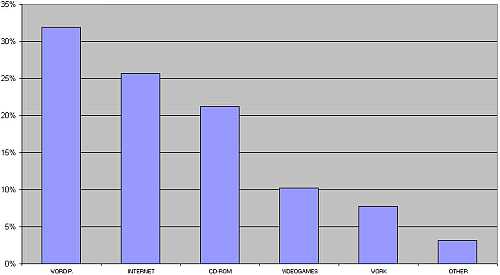
|
104. |
Do you use the computer at work? |
| |
1 I don't work |
2. Yes |
3. No |
|
105. |
At work do you bave a connection to internet? |
| |
1 I don't work |
2. Yes |
3. No |
D. Answer the following question only if you use internet at home or at work. For what do you use internet? (more than one answer possible)
|
106. |
to send and receive e-mails |
|
107. |
to look for informations (i.e. time-tables of museums, telephone numbers, weather forecasts) |
|
108. |
to download programmes, pictures, music files |
|
109. |
to buy/sell things |
|
110. |
for financial services (bank, post) |
|
111. |
to partecipate groups of discussion (forums) |
|
112. |
for fun, entertainment |
|
113. |
other (specify) |
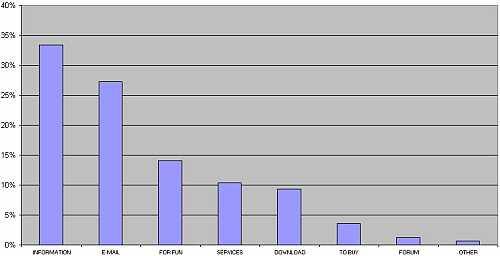
D. How did you learn to use the computer? (more than one answer possible)
|
114. |
By myself |
|
115. |
with my children or grandchildren's help |
|
116. |
attending private courses |
|
117. |
at work and/or attending refresher or training courses |
|
118. |
reading manuals or instructions |
|
119. |
with my friends' help |
|
120. |
other (specify) |
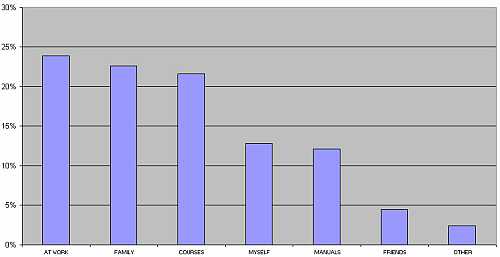
|
121. |
Did you find any difficulties in learning? (only one answer) |
| |
1. very few |
2. Few |
3. Not many |
4. Many |
|
122. |
The difficulties you had were in your opinion due mainly to (only one answer) |
| |
1. the complexity of the machines and programmes |
| |
2. my poor English |
| |
3. a psycological block towards new technologies |
| |
4. to a not adeguate cultural base |
|
123. |
How often do you use the computer at home? (only one answer) |
| |
1. very often: every day or almost every day |
| |
2. often: twice or three times a week |
| |
3. occasionaly: a few times a month |
| |
4. seldom: less than once a month |
| |
5. I don't use the computer at home |
|
124. |
If you don't use the computer: |
| |
1. You would like to use it |
| |
2. You are not interested in learning to use it (go to answer 134) |
D. You would like to learn to use the computer (more than one question possible)
|
125. |
not to be different from young people |
|
126. |
to be able to communicate with your children, grandchildren or young people |
|
127. |
not to feel isolated from a technological society |
|
128. |
to write and communicate rapidly (world processor and e-mail) |
|
129. |
to use internet |
|
130. |
to spend your time pleasantly playing video-games |
|
131. |
to improve your personal culture using cultural cd-roms (encyclopedias, art etc.) |
|
132. |
to improve your work |
|
to improve your work |
133. other (specify) |
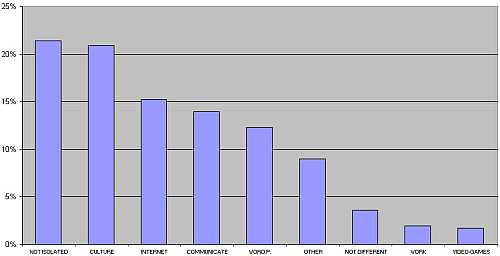
D. You aren't interested in learning to use the computer
|
134. |
because it's too difficult to use |
|
135. |
because its use is for young people |
|
136. |
because you don't have enough time |
|
137. |
because you have adequate equipment available |
|
138. |
because it's not necessary to be able to use the computer for your self-esteem |
|
139. |
because you don't see how it could be useful |
|
140. |
other (specify) |
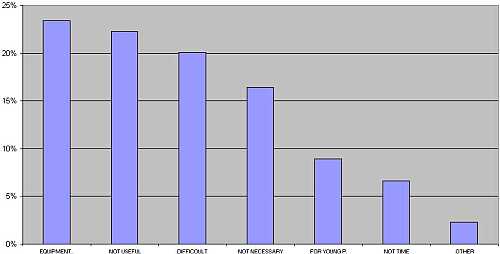
Social background
| |
1. 39-44 |
2. 45-54 |
3. 55-64 |
4. 65- 74 |
| |
5. Over |
|
|
|

|

